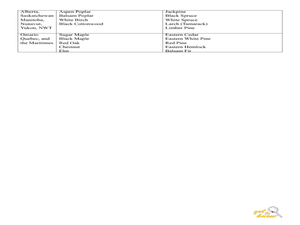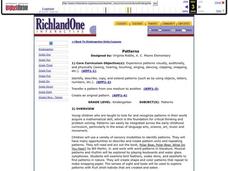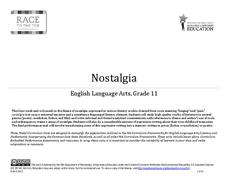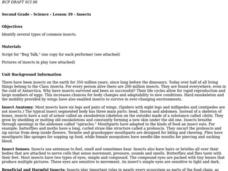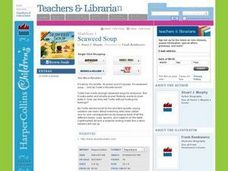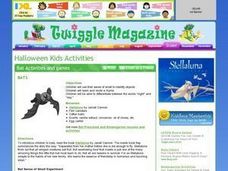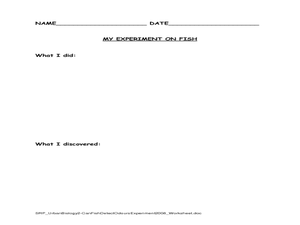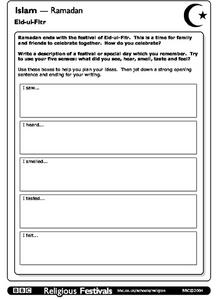Curated OER
Health and Nutrition
Students examine vocabulary words that deal with the parts of the body. They identify the body parts and organs associated with the five senses. They identify common illnesses, causes and treatments. They research various lifestyle...
Curated OER
Get to Know Trees
Students recognize the characteristics of trees by using their five senses. In this trees instructional activity, students observe and record the characteristics of trees on a field trip. Students then are blindfolded and use their...
Curated OER
Look Up!
Young scholars investigate the sky. For this weather and clouds lesson, students observe the sky and write journal entries using their five senses to describe what they see. Young scholars observe, identify, and write about the...
Curated OER
Patterns
Students create and extend patterns. In this pattern instructional activity, students learn to identify patterns using multiple senses. Students work at centers in small groups to explore and extend their understanding of patterns.
Curated OER
My Favorite Room - Brainstorming Sheet
In this writing worksheet, students brainstorm a writing piece about their favorite room. They write a purpose sentence, and fill a chart that describes the room using the senses. They write a draft using the purpose sentence and three...
K20 LEARN
Sweet and Savory Writing: Descriptive Writing
The engagement is in the details. Young scholars learn the benefit of weaving descriptive and sensory details into the fabric of their writing through the activities in this lesson. As their hands explore items concealed in bags, a...
EnLiST
Trap Your Own Insects: What’s in Your Backyard?
Young entomologists construct three types of insect traps—pitfall, pollinator, and panel—before setting their traps out and observing what they caught. They then observe what types of insects the different traps attract.
Massachusetts Department of Education
Nostalgia
To prepare for crafting their own memoir, class members examine poetry by Margaret Atwood, Billy Collins, Robert Hayden, and Claude McKay, stories by Richard Rodriquez and Willa Cather, and Barry Levinson's film Avalon. They examine how...
Curated OER
Insects
Second graders brainstorm and identify several types of common insects. They play bug bingo, building bugs and an insect tree, observing real insects in the classroom and examining some of the things insects make.
Curated OER
What Smells?
Students read the poem "Light" together and then discuss how poetry can come from anywhere.
Curated OER
Seaweed Soup
Students read the book Seaweed Soup and learn about matching. For this matching lesson plan, students read the given book, and have to keep track of all the different bowls, cups, spoons, and napkins on the table by matching them up.
Curated OER
A Sense of Location: The Mental Map
Learners consider the ways a mental maps of geographic landmarks can help migrating animals stay on the correct course.
Curated OER
Language Arts: Five Senses Walk
First graders take a discovery walk around the school. They use their observations to compose a class book about their school.
Curated OER
Bat Activities and games
First graders read the book Stelluna by Janell Cannon. In this bat lesson plan, 1st graders use their sense of smell to identify objects, learn and recite a rhyme, and differentiate between the words night and day.
Curated OER
Galaxies – Descriptive Writing
Students explore the five senses and how to incorporate them into their writing to make it come to life. In this descriptive writing lesson, students must describe objects by touching them without seeing, and describe different smells. ...
Curated OER
Salmon Homing Instincts
Young scholars role-play salmon returning to original streams using their sense of smell like the salmon do. They smell cinnamon, vanilla and peppermint on cards and follow that scent to locations in the classroom that represent their...
Curated OER
Using Descriptive Language
Students explore the technique of descriptive writing. As a class, they observe a poster and describe it using adjectives. They discuss how descriptive words can be used literally and figuratively in the world of advertising. After...
Curated OER
Urban Biology: Can Fish Detect Odors
Young scholars investigate how fish use their sense of smell. In this scientific method lesson plan, students design and perform an experiment to investigate how fish use their sense of smell. This lesson plan includes statistical...
Curated OER
Man's Best Friend
Students compare human and dog senses. In this biology lesson, students describe different ways that dogs help humans. They research and create a presentation about a modern dog hero.
Curated OER
Create Your Island Paradise
Sixth graders create a descriptive essay and map describing their island paradise. They try to evoke the reader's senses: seeing, hearing, touching, smelling, and tasting. They revise their paragraphs using their partner's feedback.
Curated OER
Standards Focus: Recognizing Vivid Details, Of Mice and Men
In this recognizing details worksheet, students read 3 excerpts from chapter 3 of John Steinbeck's Of Mice and Men, underlining each word that evokes some sensory stimulation (sight, sound, smell, touch, taste). Students also respond to...
Curated OER
LESSON 4: Looks Like Respect, Sounds Like Respect, Feels Like (K-2)
Young scholars show competency in Art objectives by designing and creating props (glasses-looks, ears-headband, and [feel] texture board) for each of the given senses.
Curated OER
Islam--Ramadan
In this Ramadan worksheet, students retell a time that their family and friends celebrated a special occasion together in their own words. Students are encouraged to include their five senses in their descriptions.
Curated OER
Applied Science - Science and Math Lab (read without sight)
Learners consider the senses. In this sight and touch lesson, students discover what it is like to function like a person who is blind. They work in groups and individually on various activities to experience this condition. This lesson...



